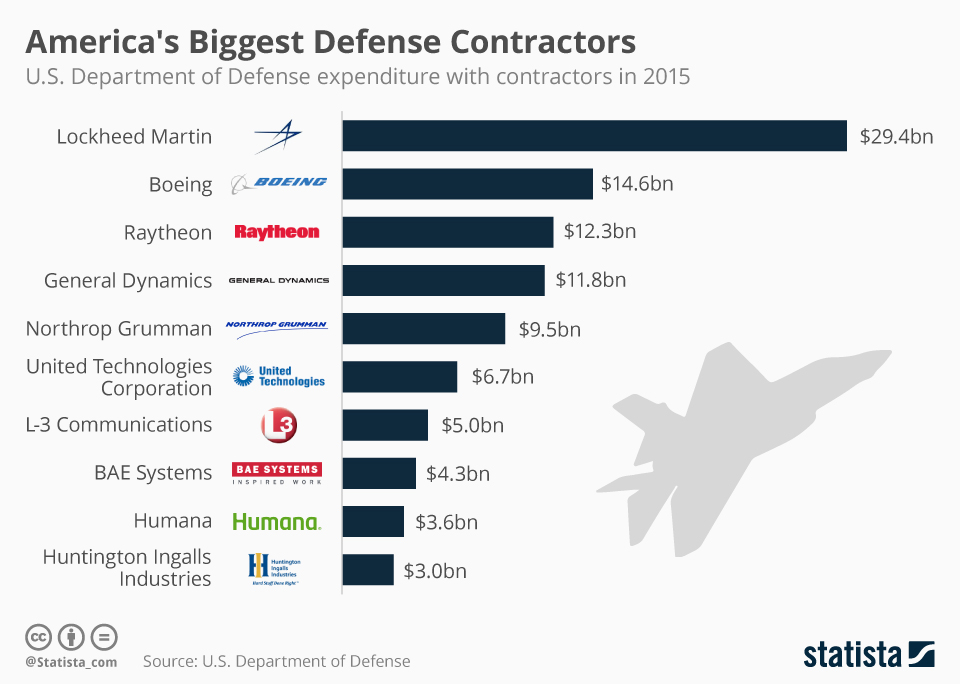
How Big Tech and Silicon Valley Are
Transforming the Military-Industrial Complex
Costs of War / Watson Institute at Brown University
Report Author: Roberto J. González, San José State University
(April 2024) — America’s military-industrial complex has been rapidly expanding from the Capital Beltway to Silicon Valley. Although much of the Pentagon’s budget is spent on conventional weapons systems, the Defense Department has increasingly sought to adopt AI-enabled systems. Big tech companies, venture capital, and private equity firms benefit from multi-billion dollar Defense contracts, and smaller defense tech startups that “move fast and break things” also receive increased Defense funding.
This report illustrates how a growing portion of the Defense Department’s spending is going to large, well-known tech firms, including some of the most highly valued corporations in the world.
Given the often-classified nature of large defense and intelligence contracts, a lack of transparency makes it difficult to discern the true amount of US spending diverted to Big Tech. Yet, research reveals that the amount is substantial, and growing.

According to the nonprofit research organization Tech Inquiry, three of the world’s biggest tech corporations were awarded approximately $28 billion from 2018 to 2022, including Microsoft ($13.5 billion), Amazon ($10.2 billion), and Alphabet, which is Google’s parent company ($4.3 billion). This paper found that the top five contracts to major tech firms between 2019 and 2022 had contract ceilings totaling at least $53 billion combined.
From 2021 through 2023, venture capital firms reportedly pumped nearly $100 billion into defense tech startup companies — an amount 40 percent higher than the previous seven years combined. This report examines how Silicon Valley startups, big tech, and venture capital who benefit from classified Defense contracts will create costly, high-tech defense products that are ineffective, unpredictable, and unsafe – all on the American taxpayer’s dime.

The Bottom Line:
America’s military-industrial complex has been expanding from the Capital Beltway to Silicon Valley. Although much of the Pentagon’s budget is spent on conventional weapons systems, the Defense Department has increasingly sought to adopt AI-enabled systems.
Big tech companies, venture capital, and private equity firms benefit from multi-billion dollar Defense contracts, and smaller defense tech startups that “move fast and break things” are also receiving increased Defense funding. The report examines how Silicon Valley startups, big tech, and venture capital who benefit from classified Defense contracts will create costly, high-tech defense products that are ineffective, unpredictable, and unsafe – all on the American taxpayer’s dime.
Key Takeaways:
- Tech Firms and Venture Capital (VC) Funded Startups Make Up A New Class of Billion-Dollar Defense Contractors. The use of drones and AI-enabled weapons systems in Ukraine and Gaza, and a feared AI arms race with China, have fueled the Pentagon’s heavy investment in advanced digital tech. New Pentagon spending streams are now destined for a novel breed of defense contractors: a combination of gargantuan tech firms like Microsoft, Amazon, and Google, and hundreds of smaller, pre-IPO startup companies supported by VC firms.
- A Lack of Transparency Obscures the Actual Value of the Largest Defense Contracts to Big Tech and Startups. One estimate indicates that US military and intelligence agencies awarded at least $28 billion to Microsoft, Amazon, and Alphabet (Google’s parent company) between 2018 and 2022. The actual value of these contracts is likely much higher, because many of the largest known contracts with US tech companies are classified and withheld from public procurement databases.
Major tech firms are also awarded large subcontracts from relatively obscure intermediary or “passthrough” companies that are granted primary contracts from the Pentagon – evading scrutiny and analysis. - Multi-Year Big Tech Software Contracts Could Lead to Dangerous Dependence on the Private Sector. Certain multi-year contracts, in which Big Tech firms are primarily providing “software as a service” rather than hardware or equipment, could make the Pentagon and CIA more dependent than ever on the expertise of technical experts from the private sector. It is also likely to lead to Defense Department officials continually relying heavily upon the goodwill and cooperation of tech leaders for their most basic functions.

- Increasing Defense Contracts with Publicly Traded Tech Companies Could Breed Conflicts of Interest. As just one example, since going public, more than half of Palantir Technologies’ revenue has come from the federal government. Recent Palantir contracts with the US Army, Special Operations Command, and the Air Force are worth more than $900 million. Palantir stock rose more than 170 percent in 2023. Pentagon contracts involving publicly traded corporations like Palantir raise questions about potential conflicts of interest and insider trading among government officials.
- A New Revolving Door Ferries Defense Officials into Big Tech Executive and Advisory Positions. Dozens of senior Defense officials are now gravitating towards defense-related VC or private equity firms as executives or advisors after they retire from public service. The traditional “revolving door” meant that a former Defense official might accept an executive position with traditional weapons manufacturers; there are more lucrative options now.
At least fifty former Defense officials are working in VC and private equity, leveraging their connections with current officials or members of Congress to advance beneficial legislation for defense tech firms in their firms’ investment portfolios. The implications are significant: the new “revolving door” will accelerate military and intelligence agency funding for early-stage defense tech startups. - Big Tech Defense Contracts Represent a Lucrative Source of Private Revenue, Funded by Taxpayer Dollars. Big Tech firms’ contracts with the Pentagon enable them to tap into an extraordinarily lucrative and endlessly expanding source of revenue. Carving out a greater share of the Defense Department’s $886 billion annual budget is an appealing prospect for the tech industry. Through this process, billions of dollars in public funds can be easily transferred to private hands in the name of national security.
- Overblown, Inaccurate, Ideological Talking Points Are Driving Defense Funding for Big Tech. Several elements are driving increased Defense contracts for Big Tech: grandiose claims about the effectiveness of artificial intelligence; the overestimation of China’s military and technological capabilities; the idea that America has the ability and duty to protect the world’s democratic societies; and a steadfast belief that the best way to preserve US dominance is through a free market that prioritizes corporate needs.
These perspectives boost demand for military AI, and are promoted by a network of tech executives, venture capitalists, think tank analysts, academic researchers, journalists, and Pentagon leaders. - Aggressive Big Tech Business Models Can Produce Inadequately Tested Weapons That Endanger Combatants and Civilians Alike. Members of the armed services and civilians are in danger of being harmed by inadequately tested—or algorithmically flawed—AI-enabled technologies. By nature, VC firms seek rapid returns on investment by quickly bringing a product to market, and then “cashing out” by either selling the startup or going public.
This means that VC-funded defense tech companies are under pressure to produce prototypes quickly and then move to production before adequate testing has occurred.
The full report is available here. For more information, please contact costsofwar@brown.edu.